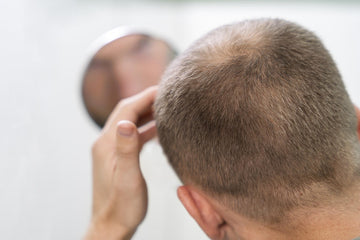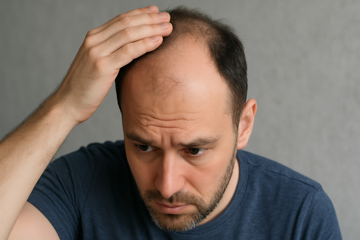Does Wellbutrin Cause Hair Loss or Help?

Marinella Helera • Aug 11, 2025
Some people notice more hair shedding after starting Wellbutrin. This can feel confusing, especially if the medication is helping in other ways, like improving their mood or energy.
Wellbutrin is often used because it has fewer sexual side effects. But some users report hair thinning while taking it. This leads many to wonder, Does Wellbutrin cause hair loss?
In this blog, we’ll explore what’s known about Wellbutrin and its potential effects on hair. You’ll learn why shedding may happen, whether it is likely to stop, and how to support healthier hair growth during treatment.
What Is Wellbutrin and How Does It Work?
Wellbutrin, or bupropion, is a prescription drug mainly used to treat depression. Doctors also use it to help people stop smoking. What sets it apart from many other antidepressants is how it works in the brain. Instead of changing serotonin levels, Wellbutrin affects norepinephrine and dopamine. These two brain chemicals help manage mood, focus, and energy.
Because it does not affect serotonin directly, Wellbutrin is often preferred by people who have experienced unwanted side effects from other antidepressants, such as sexual dysfunction or weight gain. In some cases, doctors may also prescribe it off-label for conditions like anxiety or attention-deficit hyperactivity disorder (ADHD), although this use is less common and should be closely monitored.
The medication usually starts working within a few weeks. Some people notice improvements in energy or concentration early on. However, mood changes might take longer to appear. Keep in mind that everyone reacts differently to the medication, so its effects will vary based on individual symptoms.
Does Wellbutrin Cause Hair Loss?
Hair loss is not a common side effect of Wellbutrin, but some people have reported it during treatment. Reputable medical information websites recognize that a small number of patients taking Wellbutrin report experiencing hair shedding; however, this side effect was not observed in clinical trials. When it does occur, it resembles telogen effluvium, characterized by diffuse and temporary shedding, which typically resolves either with continued treatment or after discontinuation of the medication.
Available data are limited, but current sources indicate that this side effect is infrequent, affecting well under 1% of users. Overall, expert opinions suggest that while Wellbutrin may cause hair loss in susceptible individuals, the effects are generally mild, self-limiting, and reversible.
Once the body adjusts to the medication, the shedding usually slows down and stops. Hair often regrows within a few months, especially if other factors like diet and stress are managed.
Why Might Wellbutrin Lead to Hair Loss?
Hair loss is not a common side effect of Wellbutrin, but a few people do report shedding after starting or changing the medication. Several possible reasons may explain why this happens. These reasons often relate to how the body reacts to change, both physically and mentally.
1. Telogen Effluvium
One possible cause is telogen effluvium. This condition occurs when a large number of hairs shift into the resting phase. It often follows a sudden change in the body, such as starting a new medication or dealing with stress. In this case, Wellbutrin may act as a trigger, especially in the early weeks of use. However, the hair usually regrows once the body adjusts.
2. Nutrient Deficiencies
Another reason is poor nutrition. Depression often affects appetite, which can lead to skipped meals or low food intake. As a result, the body may lack nutrients that support hair growth, such as iron, zinc, and B vitamins. These shortages can weaken hair and increase shedding.
3. Underlying Depression or Anxiety
Hair loss may also happen due to mental stress. Long-term anxiety or depression can affect hormone levels and the hair growth cycle. Sometimes, people blame the medication, but the shedding may have already started before treatment began. This makes it hard to know the exact cause.
4. Medication Interaction or Dose Changes
Lastly, changing the dose or switching medications can cause temporary hair loss. The body sometimes reacts to this shift, but it usually settles down after a few weeks. In most cases, this kind of shedding is not permanent.
How Common Is Hair Loss with Wellbutrin?
Hair loss from Wellbutrin appears to be rare. Most sources estimate it affects fewer than 1% of users. This makes it less common compared to some SSRIs like Prozac or Zoloft, where hair thinning may happen more often. Though not widely reported, hair loss may still occur in some individuals depending on other health or lifestyle factors.
Is Hair Loss from Wellbutrin Permanent?
In most cases, the hair loss is temporary. Hair usually starts to regrow within three to six months after the medication is stopped or stabilized. However, if someone has male or female pattern baldness, that type of shedding may continue regardless of treatment changes.
How to Tell If Wellbutrin Is Causing Your Hair Loss
Hair loss that appears 2-3 months after starting Wellbutrin may be linked to the medication. This timing matches with telogen effluvium, which can be triggered by stress or medications. Shedding from Wellbutrin often looks like general thinning across the scalp, not patches or bald spots. If you see patchy spots or rapid hair loss, it may point to another condition.
It is also important to consider other possible reasons. Hair loss can run in families, and low levels of iron, zinc, or B vitamins can also lead to thinning. Thyroid issues are another possible factor.
Blood tests and a visit to a healthcare provider can help rule these out. If no other explanation fits, your doctor may consider adjusting your medication or exploring other options.
What to Do If You Notice Hair Loss on Wellbutrin
Noticing more hair on your pillow or in the shower can be worrying, especially while taking a medication like Wellbutrin. Although hair loss is rare with this antidepressant, some people do experience it. Fortunately, there are steps you can take to manage the situation. Some of them are:
1. Speak With Your Doctor
The first step is to talk to your doctor. They can review your current dosage and evaluate whether Wellbutrin is likely causing the shedding. In some cases, a dose adjustment may reduce the problem. If hair loss continues, your doctor may suggest switching to a different antidepressant. It is important not to stop or change your medication without medical advice.
2. Support Hair Health
Sometimes, hair loss is linked to low levels of nutrients rather than the medication itself. Wellbutrin can affect appetite, which may lower your intake of iron, B vitamins, or zinc. These nutrients support healthy hair growth. Additionally, a blood test can help identify any deficiencies. Taking a good hair supplement like Spartan hair care products can improve your hair health from the inside.
3. Use Topical Support
Adding the right topical treatments can also make a difference. Look for a shampoo that helps block DHT and supports scalp health. DHT is a hormone that can shrink hair follicles and increase shedding in people who are sensitive to it. Scalp serums with ingredients like caffeine or biotin may also help improve hair texture and reduce breakage. Spartan’s hair care line offers formulas designed to strengthen follicles and support growth.
4. Manage Stress and Lifestyle Factors
Stress can worsen hair shedding, even if Wellbutrin is not the direct cause. Try to include daily habits that help your body manage stress. Regular exercise, consistent sleep, and relaxation techniques like meditation can lower stress levels and support overall health.
Other Causes of Hair Loss to Consider
Not all hair loss while taking Wellbutrin is caused by the medication. Several other factors may be involved and should be considered before making changes.
Male pattern baldness is a common cause, especially in men with a family history of hair thinning. This type of hair loss is linked to DHT, a hormone that affects hair follicles over time. Unlike medication-related shedding, it usually follows a pattern at the crown or temples.
Thyroid disorders, anemia, or chronic illnesses like autoimmune conditions can also lead to hair loss. These issues often affect the body’s ability to support normal hair growth. A simple blood test can help identify if one of these conditions is involved.
Lastly, stress from depression itself may be enough to trigger hair shedding. The emotional toll can impact the body and push hair into a resting phase. In these cases, the medication may not be the true cause.
Spartan’s Role in Supporting Hair Regrowth
Spartan offers a line of topical products designed to support healthy hair from the outside in. These include a shampoo, conditioner, and scalp spray, each created to complement internal care and fill in gaps that pills alone cannot address.
The Spartan Root Activator Shampoo gently cleanses the scalp without stripping natural oils. It includes ingredients like caffeine and saw palmetto, which are often used to help block DHT, a hormone linked to male pattern baldness. A clean, balanced scalp creates a better environment for new hair to grow.
The Spartan Conditioner helps soften hair while also protecting it from damage. It contains biotin and keratin, which are proteins that help strengthen strands and reduce breakage. Regular use can improve hair texture and make thinning hair look fuller over time.
The Root Activator Spray is designed for daily use and targets the root area directly. It includes ingredients that help stimulate circulation and soothe inflammation. This step supports a healthier follicle, which may help extend the hair’s growth phase.
Each product works on its own but may be more effective when used together. While these products are not a replacement for medical treatment, they can play a useful role alongside other solutions. If you are experiencing hair loss on Wellbutrin or for any other reason, topical care like this may offer one more step toward regaining healthier hair.
Conclusion
Hair loss from Wellbutrin is not common, but it can happen. When it does, the shedding is usually short-term and begins a few months after starting or adjusting the medication. Most people see regrowth once their body adapts or the treatment is changed.
To support recovery, focus on simple daily habits. Eating well, getting enough sleep, and managing stress can help reduce further hair loss. Low levels of iron, zinc, or B vitamins may also play a role, so correcting these can make a difference. At the same time, caring for your scalp can support stronger hair.
Using the right products can help along the way. Spartan’s shampoo, conditioner, and scalp spray are designed to support hair from the outside while you take care of the inside. If you notice shedding, acting early can help you protect your hair and feel more in control during the process.











